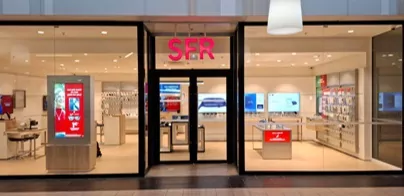
Laurent RIGOLLET & Anthony DECAUX
“Codata facilitates part of our business by enabling us to support and document our arguments during discussions with landlords or partners.”
About the company
French telecommunications operator SFR Group markets mobile and Internet offers and products for businesses and individuals.
SFR Distribution is the group’s subsidiary dedicated to consumer distribution and the management of all sales channels. Currently, the network of points of sale comprises 550 stores throughout France.
What is your role in the development of SFR?
Laurent RIGOLLET : We have missions that combine two aspects of our development: expanding our network and managing our property portfolio. Twelve months ago, we undertook a comprehensive review of our existing portfolio, focusing on both its optimisation and its development.
About ten years ago, the telephony market experienced massive growth, but we are no longer in that situation today. However, we have decided to take up the development of our network of sales outlets again.
At SFR, we are supporting this development with two key initiatives. Firstly, we have carefully analysed SFR’s DNA and identified the points of sale that are likely to be of interest to us. Secondly, we have decided to recruit a developer/negotiator — hence the arrival of of Anthony Decaux in our team.
To summarise, the current scope of our missions includes resuming our expansion, optimising our network of shops and managing our existing portfolio on an ongoing basis for renewals.
How do Codata solutions help you carry out your daily missions?

Laurent RIGOLLET: We have been using Codata solutions for many years. Since we adopted this new development approach, Codata tools have played a key role.
In terms of development, Codata allows us to refine our targeting to a specific number of retail units or commercial areas. With Codata data, we are able to refine our research and analysis, in particular by studying:
- Catchment areas,
- Competitor positioning,
- The presence of certain retailers,
- And their attractiveness…
This data allows us to be extremely precise during the development phase.
Our portfolio is relatively old, with some of our stores having opened before the 2000s. The property portfolio has aged, the real estate challenges are no longer the same, and we are seeing a clear before/after Covid divide. When it comes to negotiating renewals and getting as close as possible to the rental value of our properties, the Codata solution enables our team to provide accurate information.
In practice, how do you use the Codata solution?
Anthony DECAUX: Codata is a particularly useful tool for SFR’s development. When we discuss a commercial site or project, whether in-house or with a partner, the solution helps us decide whether or not to give a favourable opinion.
I have been working in property development for around twenty years, so I know France well, but it is a constantly changing environment. For example:
- Some shopping centres were leaders five or ten years ago but are no longer so.
- New players have entered the market.
- There has been the impact of Covid…
Codata gives us a very granular view of the commercial environment at a given moment in time. Thanks to this data, we can see that several shopping centres that were performing well 10 years ago currently have high vacancy rates, allowing us to reconsider certain projects.
Codata provides us with a comprehensive overview of the commercial environment and helps us measure the attractiveness of a shopping centre, shopping gallery or high street.
The information is accessible directly from our computers, allowing us to conduct an initial analysis of a commercial site without having to leave our offices. This saves us a lot of time and energy, as we avoid unnecessary travel.
In addition, Codata provides us with data to support our arguments in negotiations with landlords.
I also noticed the arrival of new features on the platform, such as the identification of owners of certain locations. This feature is both useful and interesting, allowing us to contact landlords directly, without going through a broker. This saves us money if we find a location that meets our criteria.
In your opinion, what are the strengths of the Codata solution?
Laurent RIGOLLET: Codata facilitates part of our business by enabling us to support and document our arguments during discussions with landlords or partners.
When negotiating with landlords, Codata data allows us to back up our arguments and arrive with concrete information.
In addition, the solution saves us time, energy and, in some cases, resources. Thanks to Codata, we avoid travel, which is an advantage both in terms of expenditure and our environmental responsibility. This allows us to focus on other essential tasks.
In summary, the solution assists us in our research and negotiations. It is a tool that provides us with concrete information to guide our decisions and trade-offs.
Anthony DECAUX: Codata backs up our statements with verifiable, quantifiable and factual data. If we want to know whether a shopping centre is attractive or not, we analyse the vacancy rate. The answer is yes if there are no vacant units, and no if there are empty units. The data is factual and there is no room for interpretation.
Codata is a well-supported and well-constructed solution. It is a great tool to aid decision-making.